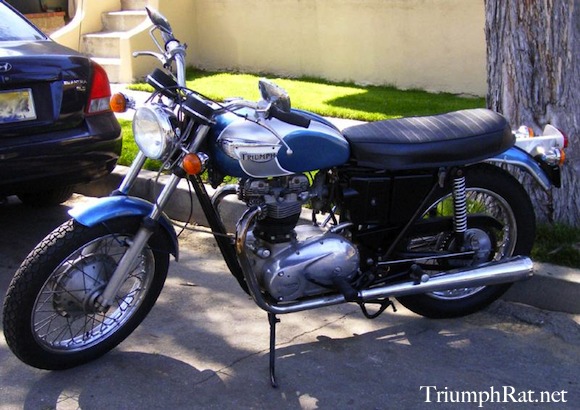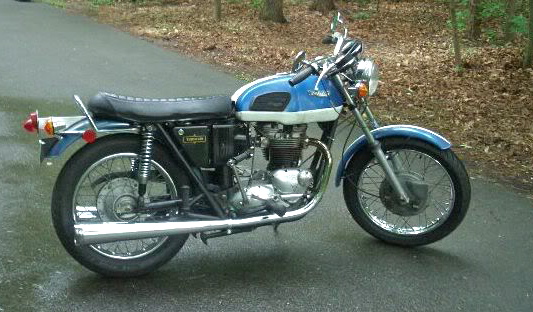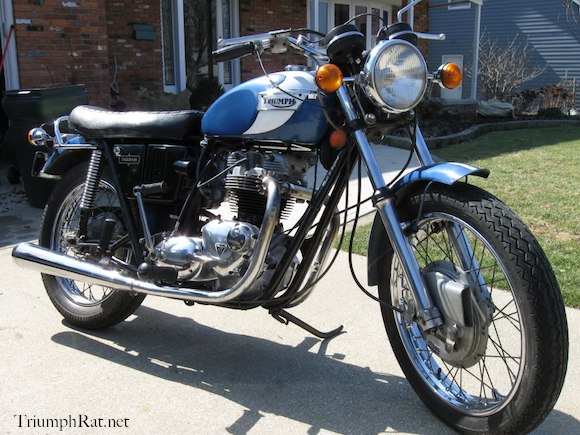1972 TRIUMPH TR6 BY THE NUMBERS
1972 was the second year for the Oil-in-Frame. There were four models for 1972: TR6R (the standard Roadster with low pipes); TR6C (with high pipes running along the left side); TR6P (Police version); and TR6RV (a Roadster with optional 5-speed gearbox). Engine & frame numbers ran from JG033084 to EG057252, built from August 20, 1971 to May 17, 1972. The paint color combinations were Polychromatic Blue & Cold While with black lining. The mudguards (fenders) were also painted blue. This was the last year for the Triumph TR6C (the last one to roll off the assemby line was #AG044359.)
1972 TRIUMPH TR6 ENGINE CHANGES
The new Quaif-derived 5-speed gearbox became optional starting with engine #CG051405, with a “V” added to the end of the model designation. Full-width cam gears were fitted for quieter operation. Starting with engine #XG043810, the cylinder heads were modified to accept a ‘push-in’ exhaust pipe fitting. Gone were the threaded-in steel flanges which the pipes clamped to. In their place was a new system (presumably designed to save money) that caused all sorts of problems. The heavy engine vibration worked the steep pipes against the soft aluminum heads & ‘hogged-out’ the holes so that they would wobble around & fail to seal. The solution was to machine threads into the exhaust ports to install the old-style screw-in spigots & clamp the pipes to them, ala 1971 & earlier. I know, because I did this exact same fix on my ’73 TR7 cum cafe racer, “Yellow Bike” Starting with #XG043810, new style rocker boxes were fitted which replaced the 4 small screw-in caps with 2 large cover plates, which greatly aided in valve adjustment. Starting with #AG046174, the cylinder head bolts were changed from a hex-head design to an Allen-head that that allowed the top end to be re-torqued without removing the rocker boxes.

1972 TRIUMPH TR6 GEARBOX MODS
The leaf spring used for indexing the shift cam was replaced with a spring-loaded plunger, as before 1970. Starting with #EG056421, the high gear bearing on the 5-speeds was changed from a 13-roller to an 11-roller, which required a new 5th gear & these are not interchangeable with the old ones. Starting with #CG051405, the clutch shock absorber inner & outer plates were secured by 3 through-bolts, now peened over to prevent loosening.
1972 TRIUMPH TR6 FRAME IMPROVEMENTS
The new oil-bearing frame introduced in 1971 was not without its problems. A good overall design, it simply wasn’t well-engineered by parent-company BSA’s “brain trust” at Umberslade Hall, the overly expensive tech center BSA had lavished its dwindling resources on. This new design center was supposed to save the company, when in fact, it hurried its demise. Among the many foibles they made was to make the seat height of the new 1971 oil-bearing frame a staggering 34-1/2 inches from the deck. Too tall for most riders. This was remedied for the 1972 Triumph TR6 with an extensive redesign of the rear frame & all the ancillaries that went with it (side covers, thinner seat, air filters, battery tray, electrical suite, all of it). This dropped the seat a full 2 inches, to 32-1/2 inches. The new seat now hinged from the left, like it was back in 1970. The rear Girling shock absorbers (suspension units) went from 12.9 inches to 12.4. All of these mods were made starting with #CG051405.

ABOVE: This 1972 Triumph TR6 Tiger sports the squarish UK-spec (3.5 Imperial Gallon) tank, whereas the US-versions had the “teardrop” tank.
CYCLE GEAR
Early 1972 Triumph TR6 models had lower front fork sliders with a rough-cast finish & a ‘styling rib’ running vertically down their sides. Later ’72’s got polished lower sliders with no styling rib, a much cleaner look. The front fenders (mudguards) got an extra stay to fight vibration & UK models got a lengthened front fender. The handlebar switch consoles were swapped left-to-right so that now the Left console had directional indicators (turn signals), the the kill switch; and the Right now had the headlight flasher button, horn & headlight dimmer (low & high-beam).

COOL CONICAL HUBS
New for the 1971 model year, Triumph introduced these gorgeous conical brake hubs, front & rear, with all new brake hardware. The 8-inch fronts were a TLS (Twin Leading Shoe) design that proved to be nowhere near as effective as the 8″ TLS unit it replaced. The pivot arms & cams had poor leverage & being conical in shape, they were not full-width as were the earlier designs. The rear was a 7-inch SLS (Single Leading Shoe), which also had leverage problems. These glitches were sorted out over the 2 model years 1971 & 1972, before the front drums were replaced in 1973 with a long-awaited front disk brake (just 5 years after Honda). One must wonder why they spent what little money they had designing an entirely new front brake when they knew they were going to replace it in a couple of years. Why not just come out with the disk brake in 1971? Alas, we may never know. However, the upside to all this is that we have lots of gorgeous conical hubs running around today, and while they may not be the most effective stopping devices, they are awfully pretty!!
1972 Triumph TR6 SPECIFICATIONS
|
Model Designations: TR6R TR6C TR6P TR6RV Engine type Displacement Bore & Stroke Compression Carburetor Ignition Engine output Primary drive Primary sprockets Clutch Gearbox, standard Ratios, overall: 1st, bottom 2nd 3rd 4th, top Gearbox, optional Ratios, overall: 1st, bottom 2nd 3rd 4th 5th, top Final drive Final sprockets Frame type Suspension, front Suspension, rear Brake, front Brake, rear Tire, front Tire, rear Fuel capacity Wheelbase Seat height Ground clearance Weight |
Roadster, low pipes Street Scrambler, high pipes Police 5-speed Roadster Air-cooled OHV vertical twin 649cc / 40.0 ci 71mm X 82mm / 2.79″ X 3.23″ 8.5:1 1- Amal Concentric R930/60, 30mm 12V battery & coil, Lucas 47 bhp @ 6700 rpm 3/8″ triplex chain X 84 links Engine 29T X Clutch 58T Multi-plate, wet 4-speed constant-mesh, right-foot shift — 11.8:1 8.17:1 6.76:1 5.84:1 5-speed constant-mesh, right-foot shift 12.78:1 9.07:1 6.92:1 5.89:1 4.95:1 5/8″ X .400″ X 3/8″ chain X 106 links Gearbox 19T X Rear 46T All-welded, large backbone, oil-bearing Telescopic fork, 2-way hydraulic damping Swing arm, 2 Girling dampers 8″ TLS drum in conical hub 7″ SLS drum in conical hub 3.25″ X 19″ Dunlop 4.00″ X 18″ Dunlop 3 Imp gal (US) / 4 Imp gal (UK & export) 56″ / 142 cm 34.5″ / 87.3 cm 7″ / 18 cm 383 lbs / 173.9 kg |


